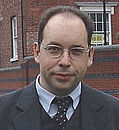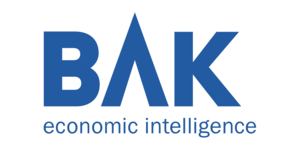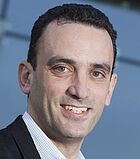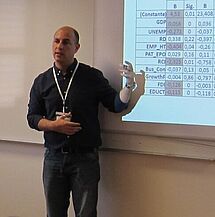Testimonials

Aiday Kasmalieva
Ph.D. Student, Technology and Knowledge Management Department
Faculty of Economics and Administrative Sciences, Fırat University, Turkey
It was a great and unique opportunity for me to participate on the course “Designing Smart Specialisation Strategies” and to learn from Dominique Foray, the father of smart specialization idea, and Martin Eichler. A good balance of theory and practice on the course gave me to systematically and deeply understand the nuances of the "Smart Specialisation" concept. This new concept have not fully been understood and adapted in Turkey yet, but some regions have developed their RIS3 according to RIS3 guide. I hope the result of my doctoral thesis will helpTurkish policymakers and public administrators who are in charge of design and development of RIS3 and will support the decision-making mechanism for the selection of potential priorities and the investment of limited regional resources to these areas.
Attending the Smart Specialization Strategy Executive course enabled me to structure my thoughts while working on transforming Cyprus into a clean-tech hub for the region. I am now able to understand what we need to study, what to measure, with whom to talk to and how to engage the Government of Cyprus in this project.
It is a step-by-step and comprehensive course, bringing nicely together simple explanations and strong conceptual backgrounds for S3 (future) practitioners. It builds up from genuine industrial regional stories (spontaneous smart specialisation) and gradually introduces and gives sense to the concept, its main theoretical and practical dimensions and key steps. The course is strong on the structure (learning objectives and lessons learnt are clarified for each module) and contents: conceptual aspects and the nature of evidence to look for (and why) are well detailed and presented. Moreover, it also provides, in a comprehensive manner, the "big picture", which is somehow lost in all our internal detailed documents. Also, the fact that it builds on student-friendly short videos and PowerPoint presentations for every session greatly helps and prevents from boringness.
Other positive aspects relate to the module assignments and peer-assessment systems. If you really follow and accept the deadline/hour system, it works pretty well to learn.
The online course on designing a Smart Specialisation Strategy has two important features to me: it is inspiring and precise.
In Russia (the country I represent) S3 has not been officially introduced yet, though the approach is very broadly discussed and is being given a lot of attention from the researchers and policymakers. Together with my colleagues – Dr. Evgeniy Kutsenko and Aleksey Kindras, I conducted the research, which deals with the analysis of Russian regional innovation strategies within S3 framework. Our hypotheses were that:
(1) some S3 principles are already considered in regional innovation strategies. More or less, regional teams know their advantages, capabilities and assets. They have an open access to S3 Guide and can follow 6 steps to design a strategy that would meet the basic requirements. All these are about localized knowledge, which any region can have independently; but
(2) with the national level missing, a strategy is hardly to become SMART. Even strong innovative regions are unable to design a smart strategy alone due to the lack of outward, global knowledge about national priorities and strategies of other regions and courtiers. Uniform rules for priorities selection, single analytical databases, organizational support, expertise and synchronization are needed. These requirements (NOT the priorities) should be determined at the superior level of governance (national or supra-national).
The video lectures and questions raised in the assignments helped me step me step to double-test these hypotheses. Presentations by Prof. Dominique Foray and Martin Eichler inspired me to think of all possible adaptation of S3 in my country, from theoretical fundamentals to operationalization. So did the home tasks, which added extra reflections on each of the course milestones related to S3 practical use. The materials and handouts were precise and clearly structured to help me with my tasks. And the final assignment was a real pleasure: so creative and effective to think over the whole knowledge I gained!
My impressions of the course would be incomplete without saying that everything was organized perfectly. Larissa and Camille were always online, ready to remind of the forthcoming deadlines or help even with unconventional issues. Many thanks for considering Easter holidays for extra-extension!
My sincerest gratitude to the whole course team: thank you for your time, knowledge, creativity, for being so inspiring, clear and well-organized!
I am a researcher and university Professor in the field of regional economics and innovation. My topics of interest are related with regional innovation systems, knowledge transfer and the role of universities in regional development. In the last 15 years I was involved in the design, implementation and evaluation of many innovation policies in Portugal. In the end of 2016, I begin to develop, as coordinator, the project “Regional Innovation Systems in the State of Pernambuco (Brazil)” financed by the European Commission DG Regio. This project intends to develop one of the first RIS3 outside the European territory. It was in this context that I decided to register and participate in the MOOC “Designing Smart Specialisation Strategies”. I thought I already had a strong background and practical expertise in RIS3 but I wanted to consolidate my knowledge and learn more about how others have designed and implemented RIS3 process. I was particularly interested to consolidate the theoretical rationale behind RIS3 and tools for the entrepreneurial discovery processes.
During the course I reserved a weekly moment to watch all the videos with attention. These videos were really useful and added value to what I already knew about RIS3. The bibliographical references, theories and practical examples, provided were helpful – especially for those like me – that wanted to go deeper on S3 thinking. Practical quizzes and formative assessments were a nice way to consolidate the main information from the videos. The weekly assignments were moments to explore and connect the obtained information with my previous understandings. The feedback from colleagues to these assignments and in special forums – where a more fluid interaction was possible - were often very relevant for the de-construction of stabilized ideas.
I remember the period of doing the MOOC as very demanding as I was in a very exigent professional period. Nevertheless, it was a great investment of time and money as the knowledge and tools learnt were being immediately applied in projects I was involved. The most significant aspect that I can underline is that this MOOC helped to consolidate my knowledge about smart specialization and changed my perspective about several key issues in S3 design.
I am a researcher and university Professor in the field of regional economics and innovation. My topics of interest are related with regional innovation systems, knowledge transfer and the role of universities in regional development. In the last 15 years I was involved in the design, implementation and evaluation of many innovation policies in Portugal. In the end of 2016, I begin to develop, as coordinator, the project “Regional Innovation Systems in the State of Pernambuco (Brazil)” financed by the European Commission DG Regio. This project intends to develop one of the first RIS3 outside the European territory. It was in this context that I decided to register and participate in the MOOC “Designing Smart Specialisation Strategies”. I thought I already had a strong background and practical expertise in RIS3 but I wanted to consolidate my knowledge and learn more about how others have designed and implemented RIS3 process. I was particularly interested to consolidate the theoretical rationale behind RIS3 and tools for the entrepreneurial discovery processes.
During the course I reserved a weekly moment to watch all the videos with attention. These videos were really useful and added value to what I already knew about RIS3. The bibliographical references, theories and practical examples, provided were helpful – especially for those like me – that wanted to go deeper on S3 thinking. Practical quizzes and formative assessments were a nice way to consolidate the main information from the videos. The weekly assignments were moments to explore and connect the obtained information with my previous understandings. The feedback from colleagues to these assignments and in special forums – where a more fluid interaction was possible - were often very relevant for the de-construction of stabilized ideas.
I remember the period of doing the MOOC as very demanding as I was in a very exigent professional period. Nevertheless, it was a great investment of time and money as the knowledge and tools learnt were being immediately applied in projects I was involved. The most significant aspect that I can underline is that this MOOC helped to consolidate my knowledge about smart specialization and changed my perspective about several key issues in S3 design.
The Northern Netherlands Alliance (SNN) tunes the economic policy of the Northern Netherlands and is a Managing Authority for ERDF. The philosophy of smart specialization and the implementation of the Northern Netherlands’ RIS3 is at the core of its regional policy. The Northern Netherlands’ RIS3 was developed in 2012 and is meant to find solutions to certain societal challenges. The road to solve those societal challenges should be paved through collaboration: bringing businesses, knowledge centres and preferably end-users together in innovative environments where the climate would be best to stimulate innovative behaviour and entrepreneurship. The core of the Northern Netherlands RIS3 is therefore to develop fertile ground for a continuous type of entrepreneurial discovery and to facilitate the creation of an ecosystem for innovation.
Therefore, in-depth knowledge of the philosophy of smart specialization (S3) and the concept of entrepreneurial discovery processes (EDP) is crucial for SNN. Along with five other colleagues, I participated in the MOOC. The MOOC was clearly and logically structured and provided me both with a theoretical framework as well as with a practical skillset to understand and elaborate on smart specialization. The MOOC helped me understand the (possible) impact of S3 and assess its importance for the region. The assignments helped me apply the theory to specific contexts and understand how to improve and develop our RIS3 further. Challenges such as RIS3 governance, implementation and monitoring were all investigated and reviewed.
All MOOC participants at SNN feel that the course helps us in our day-to-day work. During the course, we also opted to plan a discussion group once a week to discuss the course material together, understand it from different perspectives and apply it to certain specific cases. This way, we could be of help to each other. Currently, the Northern Netherlands is participating in multiple Interreg- and H2020 projects regarding smart specialization, such as Interreg Europe’s Beyond EDP and the H2020 project Online-S3. The knowledge and skillset that we gathered during this MOOC helps us to meaningfully contribute to these projects. That’s why another group of SNN employees will join the 2nd MOOC in spring 2018.
I have graduated the MOCC training on Smart Specialization on spring 2017. It was my first touch with S3 principles and I was surprised so confortable I feel during this training. Smart Specialization is something new for my region and I learn that we can be more involved in innovation, research and development by apliying those principles. My region has conceived a Smart Specialization Strategy (where I have a small contribution thanks to the ones learned from your training) which we are trying to operationalize next year. As I told you I felt, during this training, that I am part of a team where I can make mistakes to learn to develop and to contribute the development of the other. I have followed this training and, for me, it was an extreme course in the true sense of the word as I have to prepare small projects answering to the question delivered by the trainers and to explain, for me and for the others what is the sense to create a Smart Specialization Strategy and how this strategy could influence the future development of the region. The best practices presented by the trainers lead me to the way where I saw the light at the end of Smart Specialization Road. It was an excelent way to learn because that’s how you really deal with all what means Regional development and innovation through Smart Specialization. The homeworks which receive feed back from the colleagues and the final project teach me many things about the secrets of creating a Smart Specialization Strategy by involving all parteners from Quadruple Helix and, more important, regional government support. It was an interesting format really focused on abilities to design and operationalize a Smart Specialization Strategy, where you are not stressed that you can do mistakes, because your and other colleague’s mistakes are the most important opportunities to earn self-confidence and to learn. It was a training that I would repeat. I felt provoked, went to the limit, and also, safely. It was over expectation and I have really great expectation...
Thank you again for the opportunity to participate to this course.
I found the 1st MOOC course on “Smart Specialisation Strategy” very beneficial. It offered a unique opportunity to learn from Dominique Foray, who has developed smart specialisation concept. This supported me to perform better in my work in the Horizon 2020 research project “ONLINE-S3”, funded by European Union. Our project provides additional tools and guidance for European regions to elaborate and revise the regional smart specialisation strategies. The MOOC “Smart Specialisation course” gave me the possibility to verify that our tools and guidance not only fulfil the end user needs, but also are in line with the original concept and principles behind smart specialisation policy. The contents and structure of MOOC course on “Smart Specialisation Strategy” facilitated learning on the topic. There was a good balance between theory and the practice in the course. The teaching sessions felt like I was part of a discussion on the topic, which I enjoyed very much. I liked the possibility to get further readings related to each of the topics discussed. I found useful to have one weekly exercise and the final assignment at the end of the course, as this structured the workflow in several pieces and facilitated continuous engagement in the course. During the MOOC course on “Smart Specialisation Strategy” I got very interested in the concept of entrepreneurial discovery process and this inspired me to initiate my own research on the topic that has led already to several research contributions.

Vasileios Gongolidis
Policy planning officer at General Secretariat for Research & Technology, Greece
I currently work at General Secretariat for Research and Technology of Greece, the authority responsible for designing the National RIS3 of the country. I have been involved with the preparation and implementation of the National RIS3 since 2012. Back then the concept was very new to me and my colleagues and we were trying to find relevant material to read and understand more in-depth how to apply the concept to practice. We almost “kidnapped” prof. Dominique Foray, during one of his visits to Greece, to try and find more concrete answers!
The MOOC course “Designing a Smart Specialisation Strategy”, though it started after the completion of the National RIS3 design, proved very helpful because finally all the elements of the methodology were presented in order, backed with the appropriate theory and examples. The assignments that were given to us attending the course, was an opportunity to reexamine some choices made in the elaboration of the National RIS3 and consider possible adjustments in the future. I do think that the MOOC course was very helpful and easy to attend from my office or home, considering the limited available time. MOOC team, keep up the good job!

Jie Shen
Ph.D student at Huazhong University of Science and Technology
College of Public Administration, Center for Technology Policy and Technology Innovation, China
I am Ph.D student in the field of Technology policy, regional innovation and innovation driven growth. I started knowing smart specialisation from the OECD report” Innovation-driven growth in regions: the role of Smart Specialisation”.This concept matches the innovation driven growth strategy in China very well. As in China, the materials about smart specialisation were mainly in paper version. It was in this context that I participated in the MOOC “Designing Smart Specialisation Strategies”. I have been studying smart specialisation for one year in China, but the MOOC will deepen my understanding of smart specialisation and consolidate the theoretical rationale behind RIS3 and how to start an entrepreneurial discovery processes.
Despite the time difference, I attended the whole courses of the MOOC. Thanks to the MOOC, I have had an unique and a face to face opportunity to learn from Dominique Foray. The teaching sessions and the compassion of the courses opened a new door to me. Practical quizzes and formative assessments were useful to do the self-checking after watching the teaching videos. The weekly assignments were my favorite parts for connecting my understanding with the obtained information that gained from the videos. Watching the feedback from the colleagues and in special forums provided an effective interaction which brought out some new ideas and enlighten my thoughts. What I have gained from the first MOOC on smart specialisation inspired me to further my research on regional innovation strategy.
Even if I had a good background in smart specialisation before attending this course, the way information is structured in the course, the homework tasks and the additional topics we have been asked to tackle represented for me a very valuable step forward to sediment and see from a comprehensive way the relevance of smart specialisation in regional competitiveness. I truthfully recommend this course both to beginners and experts in smart specialisation and regional development because it provides the key information and training path to fundament and run a mature RIS3. The course combines in a very balanced manner both theoretical and practical aspects, succeeding to put me in front of several conceptual and real-life challenges in relation with modalities to run effective strategies and action plans for regional innovation.
I signed up for this MOOC just a few months to my master’s graduation early this year. My research had focused on the effectiveness of public policy on digital transformation initiatives in Kenya’s national government. My analysis arising from the findings left me posing more questions whose answers I was certain could not be addressed in the said study. I stumbled upon the smart specialisation concept when I was gleaning works on evidence-based policy, saw the advert on a forthcoming course and took the leap of faith to enrol!
I generally found the coursework intense with the assignments (structured to culminate to the final project) demanding discipline in order to meet the submission deadline. In unique cases, the programme administrators were however amenable to extend the same if need be. This possibly attests to the quality of work that went into creating the course in the first place. I’ll be candid about one thing though: It was not an easy course. I entertained the notion of dropping out at some point but then recognising the investment already made I challenged myself to stay on. Perhaps this also stems from my no prior familiarity with the concept. I hail from Africa where unlike the EU, broader regional policy is mostly never mirrored at the country-level policy discourse which has led me to question the whole idea of integration as advanced by bodies such as the Africa Union, East Africa Community etc. This outsider feeling notwithstanding, I really appreciated the discussion boards where my classmates who were mostly industry experts shared their views on a given topic for discussion based on their experience while in response Dominique and Martin (the course convenors), elucidated areas where one had not fully grasped thus improving our understanding. The transcripts alongside the videos were also a gem. I simply used to save the same in a folder on my computer after watching the video content and consult the same while working on the weekly assignments instead of having to go back to the video. While the peer review format in marking the weekly assignments was a valuable learning tool to appreciate the thinking of peers in the class, I found the marking of the final formative assignment by the principal course convenors as bespoke and a distinguishing feature for a MOOC. At the end, you also get an attestation of attendance that can be used to evince your skill.
Having worked in Kenya’s justice sector for nearly a decade, I am looking for a career transition and the course opened up my mind to a raft of ideas I could explore. Smart specialisation illuminates principles that have emanated from my research interests and the course has sure given me the much needed footing on what I could probably pursue for PhD. I am also proud to be the only alumnus from Sub-Sahara Africa to have successfully undertaken this course!
A project by









